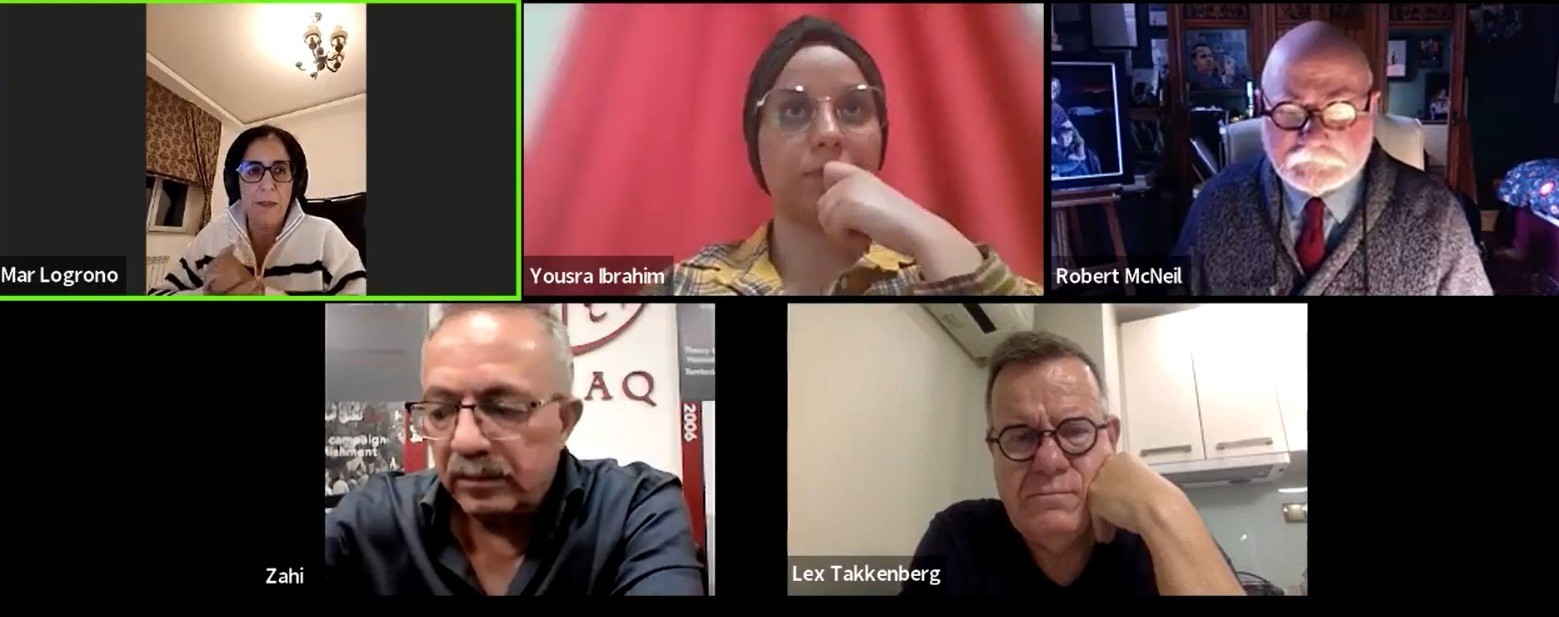With the continued and escalating Israeli crimes in Gaza, human rights organizations and forensic experts are working to monitor and document violations of the crimes of “genocide” and “war” crimes taking place in the Gaza Strip, which have so far claimed the lives of about 10,000 Palestinian martyrs.
In a seminar held by the Arab Renaissance for Democracy and Development (ARDD), in line with a series of other digital seminars within the programs of the Palestinian Cause and Access to Justice, entitled: “From temporary mortuaries to court corridors… Evidence Track: Gathering Forensic Evidence on Mass Murders in Palestine”, Monday, 6 November 2023, in which Robert McNeill, an expert in forensic techniques and forensic analysis, and Zahi Jaradat, head of the monitoring and documentation department at Al-Haq, stressed the need for continuous recording and documentation of the killings, injuries, and violations taking place in Gaza, to submit them to the International Criminal Court.
Dr. Maria Logrono, the main advisor for Access to Justice and Inclusive Social Protection at ARDD’s Al-Nahda Center, stressed the need to document evidence in war crimes, especially in light of the monitoring done by many human rights and humanitarian organizations of the situation of the besieged population in Gaza, the demolition of hospitals and places of worship, and the direct targeting of women and children, stressing the need to raise awareness of the importance of fact-finding and refutation of allegations.
For his part, McNeil, who was one of the independent technical experts in monitoring and analyzing several war crimes, the most important of which is the Serb genocide of the Muslims of “Srebrenica” in Bosnia and Herzegovina in 1995, considered that technology has a major and important role in the process of documenting crimes, stressing the importance of preserving evidence in cases of genocide, war crimes, and crimes against humanity.
McNeil went on to stress the importance of the different roles of workers in this field, such as radiographers, anthropologists, paramedics, doctors, as well as journalists and workers in relief organizations, among other professionals, especially since the evidence that is recorded and documented is important for the post-fact-finding phase of genocide, indicating that photographs and videos recorded through cameras and mobile phones are among the most important monitoring tools for the purposes of documentation in Gaza.
Moreover, McNeill gave a presentation on the sites of the temporary graves and how the specialized investigation teams deal with them, stressing the need to follow the rules of public health and safety of the working group in these cases, preserve the evidence and integrity of the process, as well as focusing on DNA testing to identify victims and those affected by wars, as it is one of the important indicators that has contributed to trying many individuals for genocide during previous wars.
Regarding the mechanisms employed by the Palestinian Al-Haq foundation to monitor the violations and war crimes in Gaza, Jaradat indicated that the foundation relies in its work on forms, and on the recording of testimonies of eyewitnesses and the victims themselves, as well as that of the detainees from the moment of arrest until their release, in addition to the adoption of photography, which it has been using since 2015, pointing out that there are 150 researchers working on preparing field reports attached to the evidence, as well as relying on the reports of doctors and paramedics and their testimonies about injuries, whether injuries with conventional weapons, internationally prohibited weapons, automatic bullets, or chemical weapons.
Jaradat said that many Palestinian institutions, such as Addameer, the Arab Center for Human Rights, Mizan, and Al-Haq, are working diligently to document various crimes, warning of a new Nakba in light of the expansion of forced displacement in the Gaza Strip. Furthermore, he pointed out that these institutions have already submitted three documented files on previous wars to the Criminal Court and the Human Rights Council, noting that coordination is taking place with forensic experts in Britain, Norway, and the US to investigate the facts of these War, as in previous wars.
According to Jaradat, they are focusing on the testimonies of doctors and paramedics and resorting to experts in autopsy and forensic analysis, because the initial medical diagnosis shows the entry and exit wounds and the effects resulting from that, as well as the nature of the weapon used, stressing their role in identifying crimes and violations in conflict areas, and the importance of recording their observations and testimonies about the cases they deal with in a clear and accurate manner, based on their personal and practical experiences in the field.
In conclusion, it is important to document crimes in general, and in Gaza in particular, and to identify the mechanism by which genocide and war crimes are dealt with globally, which today raises the need for cooperation between all human rights, civil, and media institutions to contribute to the application of the principle of accountability, in addition to our need for comprehensive and accurate documentation to support legal procedures and seek justice in conflict-affected areas, and to provide all evidence immediately after the end of the war to be investigated, as monitoring and documentation are among the most crucial processes to confirm the violations that have taken place against individuals, as they pave the way for a strong basis for legal action to be taken by the relative authorities.


